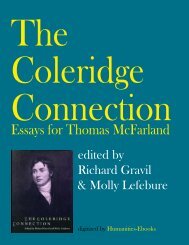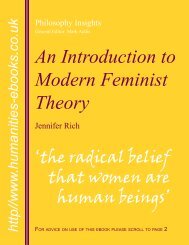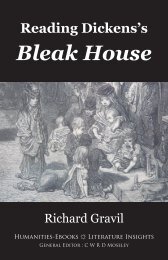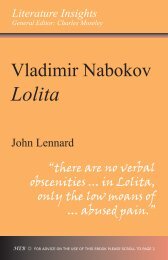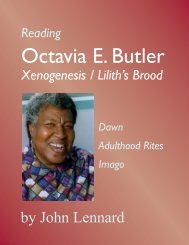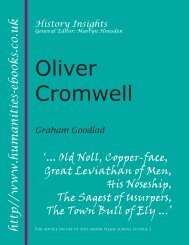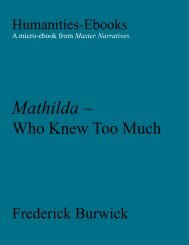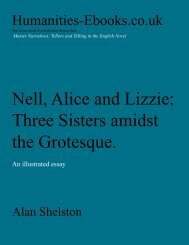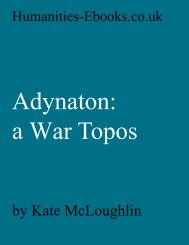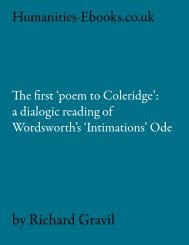Gerard Manley Hopkins - Humanities-Ebooks
Gerard Manley Hopkins - Humanities-Ebooks
Gerard Manley Hopkins - Humanities-Ebooks
You also want an ePaper? Increase the reach of your titles
YUMPU automatically turns print PDFs into web optimized ePapers that Google loves.
Running Head 1<br />
http//www.humanities-ebooks.co.uk<br />
Literature Insights<br />
General Editor: Charles Moseley<br />
<strong>Gerard</strong> <strong>Manley</strong><br />
<strong>Hopkins</strong>: a study of<br />
Selected Poems<br />
John Gilroy<br />
For advice on use of this ebook please scroll to page 2
Publication Data<br />
© John Gilroy, 2007<br />
The Author has asserted his right to be identified as the author of this Work in accordance<br />
with the Copyright, Designs and Patents Act 1988.<br />
Published by <strong>Humanities</strong>-<strong>Ebooks</strong>.co.uk<br />
Tirril Hall, Tirril, Penrith CA10 2JE<br />
Reading and Listening Options<br />
* To use the navigation tools, the search facility, and other features of the Adobe<br />
toolbar, this Ebook should be read in default view.<br />
* To navigate through the contents use the hyperlinked ‘Bookmarks’ at the left of<br />
the screen.<br />
* To search, expand the search column at the right of the screen or click on the binocular<br />
symbol in the toolbar.<br />
* For ease of reading, use to enlarge the page to full screen<br />
* Use to return to the full menu.<br />
* Hyperlinks appear in Blue Underlined Text.<br />
Licence and permissions<br />
This book is licensed for any computer you own. It may not be duplicated for further<br />
distribution, which would be in infringement of copyright. Please rewspect the author’s<br />
rights in ths matter, having regard to the exceptionally low price of the work.<br />
Permissions: high resolution printing is enabled, but copying and pasting is not.<br />
ISBN 978-1-84760-012-7
A Note on the Author<br />
John Gilroy took his BA at the University of Newcastle and his MPhil at the University<br />
of Warwick. He is co-author of A Commentary on Wordsworth’s ‘Prelude’<br />
1-5 (London: Routledge and Kegan Paul, 1983) and has contributed to various literary<br />
publications. He was Senior Lecturer in English at Anglia Ruskin University,<br />
Cambridge from 1974 until 2006, and is a course director for the University of Cambridge’s<br />
International Programmes.<br />
Acknowledgments<br />
The author wishes to thank: Charles Moseley for valuable editorial advice; The National<br />
Portrait Gallery, London, for permission to reproduce the two portraits of <strong>Hopkins</strong>;<br />
and the Tate Gallery, Millbank, London for permission to reproduce the picture,<br />
‘Snowstorm – Steam Boat off a Harbour’s Mouth’ by J. M. W. Turner. Work in copyright<br />
is reproduced by permission of Oxford University Press on behalf of the British<br />
Province of the Society of Jesus.
<strong>Gerard</strong> <strong>Manley</strong> <strong>Hopkins</strong>:<br />
Selected Poems<br />
John Gilroy<br />
Bibliographical Entry:<br />
Gilroy, John. <strong>Gerard</strong> <strong>Manley</strong> <strong>Hopkins</strong>: Selected Poems. Literature Insights. Tirril: <strong>Humanities</strong>-<br />
<strong>Ebooks</strong>, 2007
In memory of<br />
Mgr K.F.Nichols (1929–2006)<br />
Poet and teacher
Contents<br />
A Note on the Author<br />
Acknowledgments<br />
Part 1. Life and Times<br />
1.1 Early life and Schooldays<br />
1.2 Oxford<br />
1.3 Conversion to Catholicism<br />
1.4 <strong>Hopkins</strong> the Jesuit<br />
Part 2. Strategies<br />
2.1 Introduction<br />
2.2 Inscape<br />
2.3 Inscape of Poetry<br />
2.4 Instress<br />
2.5 Sprung Rhythm<br />
Part 3. Reading <strong>Hopkins</strong><br />
3.1 ‘The Wreck of the Deutschland’<br />
Part the first<br />
Part the second<br />
3.2 Selected Poems<br />
Part 4. Reception<br />
Part 5. Bibliography<br />
5.1 List of Abbreviations Used in the Text<br />
5.2 Recommended Reading<br />
Hyperlinked Materials<br />
Other Literature Insights: Now Available
Part 1. Life and Times<br />
1.1 Early life and Schooldays<br />
<strong>Gerard</strong> <strong>Manley</strong> <strong>Hopkins</strong> was born in 1844 at Stratford in Essex, the eldest of nine<br />
children, several of whom were talented. Two of his brothers, Arthur and Everard<br />
grew up to be artists and illustrators for prominent publications such as Punch and the<br />
Illustrated London News. A brother, Lionel, became a Consul in China and an expert<br />
on the Chinese language, while a sister, Grace, had skills as a musician and composer.<br />
The children’s father, <strong>Manley</strong> <strong>Hopkins</strong>, acted as Consul-General for Hawaii,<br />
pursued a profession as a marine insurance adjuster and was, by degrees, mathematician,<br />
poet, novelist and reviewer. His wife, Kate, was well-educated with literary and<br />
musical tastes and a competence in languages, and his sister, Ann (‘Aunt Annie’), a<br />
talented painter, produced the portrait of G. M.<br />
<strong>Hopkins</strong> at the age of fourteen which is now<br />
in the National Portrait Gallery, London. In<br />
<strong>Gerard</strong>, it seems, all these various accomplishments<br />
in language, in literature, art and music<br />
came together to produce in the course of time<br />
the unique corpus of poetry that would make<br />
him famous.<br />
The <strong>Hopkins</strong> family was solidly middleclass<br />
and Anglican in religion. From childhood,<br />
<strong>Gerard</strong> shared their devoutness which<br />
deepened as he matured, leading finally to his<br />
conversion to Catholicism and ordination into<br />
the Roman Catholic priesthood. When he was<br />
eight years old the family moved from Stratford<br />
‘<strong>Gerard</strong> <strong>Manley</strong> <strong>Hopkins</strong>’<br />
by Anne Eleanor <strong>Hopkins</strong> (1859)<br />
National Portrait Gallery, London<br />
to fashionable Hampstead in North London<br />
and he was sent to Highgate School. There he<br />
became friendly with, among others, Marcus
<strong>Hopkins</strong>, Selected Poems<br />
<br />
Clarke who wrote the novel, For the Term of His Natural Life (1870), and Ernest<br />
Coleridge, grandson of the poet who had lived, died and was buried at Highgate.<br />
Perhaps Coleridge’s most famous poem, ‘The Rime of the Ancyent Marinere’, had<br />
something to do with the much-quoted schooldays episode of <strong>Hopkins</strong>’s abstinence<br />
(ostensibly for a bet) from all liquids for three weeks. ‘The real reason’, wrote a<br />
schoolfriend, Charles Luxmoore, was ‘a conversation on seamen’s sufferings and<br />
human powers of endurance’ (FL 395). ‘With throats unslaked, with black lips baked’<br />
(l.162) is certainly similar to a schoolfellow’s recollection of ‘<strong>Gerard</strong> showing him<br />
his tongue just before the end and it was black’ (FL 395). <strong>Manley</strong> <strong>Hopkins</strong>, in his<br />
youth, had written a poem, ‘The Philosopher’s Stone’, in the manner of the ‘Ancyent<br />
Marinere’, and two of <strong>Hopkins</strong>’s poems from his schooldays, ‘Spring and Death’,<br />
and ‘Winter with the Gulf Stream’ contain phrases on which Coleridge’s poem has<br />
obviously been something of an influence. In any event, the story points to an early<br />
strength of will and the kind of rigorous determination which would characterise the<br />
poet for the rest of his life.<br />
<strong>Hopkins</strong>’s years at Highgate were academically distinguished and he proved to<br />
be a brilliant classical scholar as well as a potentially talented poet, winning school<br />
prize for a composition entitled ‘The Escorial’ in 1860. The poem, in Spenserian<br />
stanzas, with its echoes of Keats and its interest in architecture, and another early<br />
illustrated poem, ‘A Vision of the Mermaids’ with ‘Winter with the Gulf Stream’ in<br />
the notoriously difficult terza rima form bring together, at this comparatively early<br />
stage, many of the mature poet’s characteristics, the visual, sensual and formalist elements<br />
associated with his later work.<br />
1.2 Oxford<br />
In April 1863 <strong>Hopkins</strong> went on a scholarship to Balliol College, Oxford, to study<br />
Classics. One of his tutors, Benjamin Jowett, University Professor of Greek and later<br />
the Master of Balliol, was leader of the Broad Church movement there. The Broad<br />
Church faction at Oxford University, at this time an ecclesiastical institution run<br />
exclusively by dons who were celibate and in orders, was attempting to reconcile the<br />
fundamental truths of Christian belief with the increasingly invasive rationalism of<br />
the nineteenth century. In his collection entitled Essays and Reviews (1860), Jowett<br />
<br />
<br />
A stanza form used by Edmund Spenser for The Faerie Queene (1590-96) in which the first eight<br />
8 lines are in iambic pentameter and the ninth is an iambic hexameter (an Alexandrine).<br />
Interlinked tercets where each is joined to the one following by a common rhyme: aba, bcb, cdc,<br />
and so on.
Is this sample what you are looking for?<br />
If so, please browse our lists<br />
or look for different formats at:<br />
http://www.humanities-ebooks.co.uk<br />
or buy this PDF book<br />
HERE<br />
About <strong>Humanities</strong> <strong>Ebooks</strong><br />
<strong>Humanities</strong>-<strong>Ebooks</strong> is an an authors’ co-operative, not a commercial publisher.<br />
Our aim is to produce inexpensive, high quality <strong>Ebooks</strong>, and to pass the maximum<br />
possible proportion of the purchase price to their authors.<br />
Almost all our titles are available in Kindle format, though for academic books<br />
and those with complex layout the PDF is almost invariably superior.<br />
All our titles can be ordered by libaries through Ebrary, EBSCO and MyiLibrary.<br />
Paperback versions of many of our titles can be reached via the book descriptions<br />
on our website.





